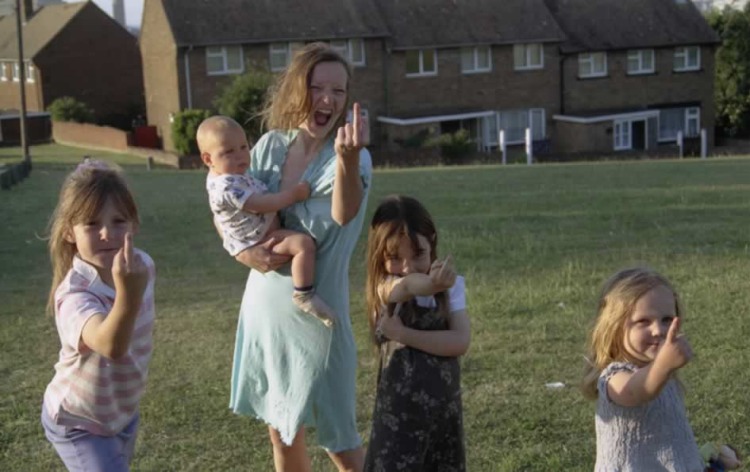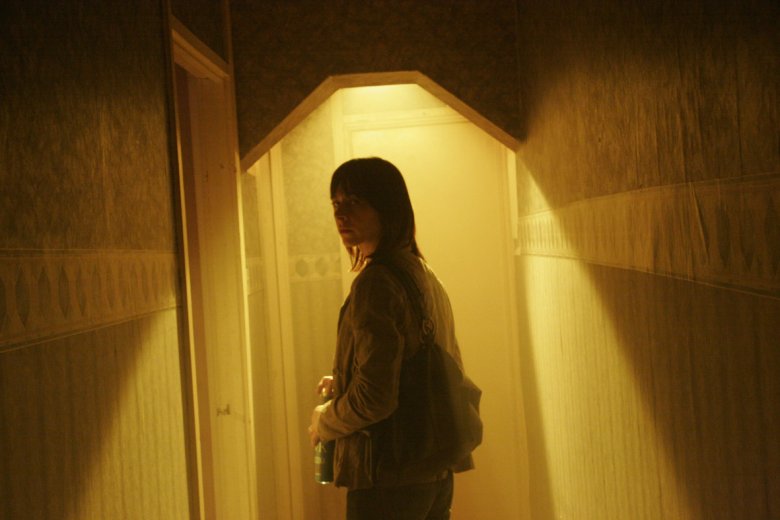This guest post written by Sophie Hall appears as part of our theme week on Women Directors.
If we were to play a game of word association with the offensive word ‘chav’ (a pejorative term that “demonizes” working class people), what would immediately spring to mind? If you’re aware of how the word makes appearances in British tabloids, your words are probably going to be less than savory. ‘Uneducated,’ ‘racist,’ ‘unemployed,’ ‘scroungers,’ and ‘breeders’ are unfortunately likely to be the first among them — horrible stereotypes of poor people. British director/screenwriter Andrea Arnold has three short films and three feature films under her belt, and four out of six of those center on working class people. But Arnold does something unique with this; instead of avoiding the offensive ‘chav’ label, she embraces it and all of its connotations to the characters’ very core, all the while asking the audience: when is it okay to mock these people?
In her Oscar-winning short film Wasp (2003), Andrea Arnold takes on the stereotypes of working class women to an almost unbearable extent. The film focuses on a single mother and her four children over the course of a day. Our protagonist Zoe, a white working class woman in her twenties, drags her kids (and herself) half clothed to a neighboring house so she can attack the mother of a child who attacked her own. When Zoe discovers that the only edible thing she has in her council flat (public housing apartment) is moldy bread, she gives her children a bag of sugar to satisfy their appetites. Later, she leaves her children unattended outside a pub for hours while she stays inside on a date. At first you may be mistaken for believing this is more an advertisement for contraception than a short film.
https://www.youtube.com/watch?v=LemvMDQaRTo
While doing press junkets for the release of Fish Tank, Arnold stated in an interview:
“There’s a lot of press on hoodies and gangs and single mums and a lot of simplistic things said about these people. Every single person is complicated and if you look at everyone’s life they’re complex… you shouldn’t make assumptions about people, you should look at everyone individually and make no judgments.”
Arnold doesn’t just present these extreme flaws in Zoe; she also grants her the benefit of context. Zoe has four children, but she can’t even be in her thirties yet and there is no mention of support in her life. Where is the father(s) of her children? Zoe’s flat is decorated with glittery memorabilia, she compares herself to Victoria Beckham and hopes to one day find her David (with a magazine picture of him stuck to her wall). Zoe isn’t a grown woman, she’s a teenager stuck in the body of one. No one is there to realize this though, as Zoe’s mother “has a better social life than I do,” and the unasked question on absent men lingers in the air again — where is Zoe’s father in all of this? From the locals inside the pub, she gets criticized for her skills as a mother instead of support. Arnold presents these bread crumbs, not sob stories, to emotionally manipulate the audience. Here are her flaws, and these are the reasons why she has them. She presents us with three-dimensional characters, something absent from the headlines of The Daily Mail centering on working class people.
In the book Chavs: The Demonization of the Working Class, writer and political commentator Owen Jones refers to a speech Prime Minister David Cameron gave:
“We talk about people being at risk of poverty, or social exclusion: it’s as if these things — obesity, alcohol abuse, drug addiction — are purely external events, like a plague, or bad weather. Of course, circumstances — where you are born, your neighbourhood, your school and the choices your parents make — have a huge impact. But social problems are often the consequences of the choices people make.”
Jones comments that:
“Cameron was tapping into sentiments that Thatcherism had made respectable: the idea that, more often than not, less fortunate people had only themselves to blame (page 74).”
This theme pulses through Wasp; is Zoe’s life the consequence of her own choices or of the society that has neglected her?
In Andrea Arnold’s feature length debut Red Road (2006), she doesn’t deconstruct stereotypes like in Wasp, but she still makes working class life visibly present. The film centers on Kathy, a working class woman in her thirties who is a CCTV operator. Through her loneliness, she observes the lives of the people she monitors with more than a professional interest. One day, she notices a man from her past who caused a great trauma in her life. This man is also working class. Kathy has her trials and tribulations to face over the course of Red Road, but being a working class woman isn’t one of them (nor should it always have to be). Arnold exposes viewers to working class life; instead of a drama set in a semi-detached Victorian house, why not a block of flats for a change?
Andrea Arnold’s follow up film was Fish Tank (2009), or as I like to call it, Wasp 2.0. The fish of the story is fifteen-year-old Mia. She spends her days stuck in the tank that is her council estate (public housing complex) in Essex, which just got smaller as she recently fell out with her best (and only?) friend Keeley. There’s not a lot for her to do in the fish tank — she dreams of one day becoming a dancer and practices in empty rooms. When she’s not doing that, she’s leaning against the glass of the tank, staring enviably at families and groups of friends, all the while binge drinking cheap hard cider and chain smoking.
Arnold taps in to David Cameron’s previous statement with the way she uses cinematography to stalk Mia. We the audience follows her, hand held, uncomfortably close like a documentary. We feel Mia’s claustrophobia and how she — and us — beg to break out of the confines of the tank.
The character of Connor preys on the working class. He uses Mia’s mother and emotionally toys with Mia. In one scene, Connor and Mia are in a lake trying to catch a fish. Connor tells Mia to walk slowly towards him so that the fish will go to him also. It is not just the fish that is hypnotized by Connor. The next day, Mia spots the caught fish dead on her kitchen floor, being devoured by her dog. This is a reflection of Connor’s degradation of the working class women at the end of the film. When he realizes that he could be arrested for statutory rape after sleeping with Mia, he discards both women without a word.
What I also admire about Arnold’s direction is that in both Red Road and Fish Tank, both Kathy and Mia’s characters envy other characters that are seemingly fulfilled, but are also working class. I find this detail pivotal, as it shows that Arnold isn’t saying that even though the characters face certain economic and social status restrictions, they aren’t striving to abandon their class. One class is not superior to the other.
In today’s society, the working class are consistently expected to be striving towards the middle class instead of being proud of their own class. In the book Chavs, Jones states that:
“Those labeled ‘chavs’ became frequently ridiculed for failing to meet lofty middle-class standards in what they wore, or how they ate. Celebrity chef Jamie Oliver was rightly applauded for his crusade to bring healthy food to the British school dinner menu. But it was a campaign marred by tut-tutting at the eating habits of the lower orders. On his Channel 4 programme, Oliver referred to parents who failed to sit around a table for dinner as ‘what we have learned to call “white trash”’. Jonathan Ross asked him on BBC1: ‘Well, do you ever think that some people shouldn’t be allowed to be parents? Like people from council estates?’ It was a ‘joke’ met with cheers (page 144).”
Arnold continued to explore themes of classism in her most drastic departure from her usual style yet, in her adaptation of Wuthering Heights (2011), her first take on a costume drama. Brontë’s Heathcliff is described as “dark-skinned.” Yet the ambiguously mixed race character is usually played by white actors. Arnold cast Black actors Soloman Glave and James Howson to portray the young and adult versions, respectively, of Heathcliff in her interpretation. The film introduces Heathcliff as a working class boy found on the streets of Liverpool. Like Mia and Zoe, the words that recur most in Heathcliff’s vocabulary are ‘fuck’ and ‘cunt.’ Arnold constructs the narrative to be solely through Heathcliff’s viewpoint, rather than housekeeper Nelly’s gaze of the pair’s relationship.
Throughout his childhood, the cantankerous Heathcliff always had Cathy as a rock to lean on. It didn’t matter how he spoke or what words he said, because he didn’t need to say anything with her. They communicated with delighted shrieks as they played in the moors. They spoke by holding each other as they shared a bed at night. At one point when Heathcliff’s back is beaten bloody, Cathy shows her sympathy by licking his wounds clean. That changes when Cathy is introduced to middle class society. She distances herself from Heathcliff by withdrawing her body from him and speaking to him condescendingly in her newly adopted manner.
Even though the film is a love story between Cathy and Heathcliff, it is Heathcliff’s narrative that Andrea makes us live through. She deemed the narrative of a working class man of color more vital than that of a white middle class woman. Like the audience feeling claustrophobic with Mia in her fish tank, the audience feels every whip that Heathcliff suffers, every burn from the stick that hits his flesh, every curse that’s thrown his way. The cinematographer isn’t concerned with capturing Cathy’s pain, who is screaming for mercy on behalf of Heathcliff off-screen.
Arnold’s overall message for Heathcliff’s story, and overall her main characters’ entire stories, becomes plainly evident in where she decided to end the film. In Brontë’s novel, we see Heathcliff spiral into villainy over his toxic love for Cathy and eventually die years later. However, Arnold’s version sees Heathcliff walking off into the moors, the fog making his path uncertain, just like his future, after he failed to open Cathy’s coffin to join her in death. Though seemingly grim, this is the optimistic ending that Arnold always offers her characters.
Zoe, Kathy, Mia and Heathcliff all venture off away from the preconceived notions they have been given, away from the stereotypes forced upon them, and the boxes society has trapped them in. Whether those boxes are council houses, fish tanks or Wuthering Heights.
External Sources: Jones, Owen. Chavs: The Demonization Of The Working Class. Verso, 2011.
See also at Bitch Flicks: The Enemy: Race and Gender in Andrea Arnold’s ‘Wuthering Heights’
Sophie Hall is from London and has graduated with a degree in Creative Writing. She is currently writing a sci-fi comic book series called White Leopard for Wasteland Paradise Comics. Her previous articles for Bitch Flicks were on Mad Max: Fury Road and Star Wars: The Force Awakens. You can follow her on Twitter at @sophiesuzhall.





3 thoughts on “Andrea Arnold: A Voice for the Working Class Women of Britain”
Comments are closed.